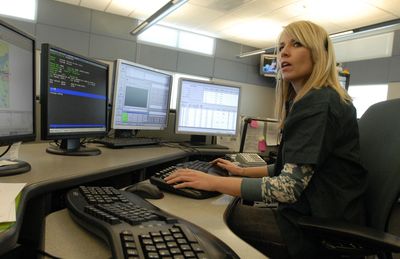Crime Check poised to resume duty
Service cut in 2004 returns, thanks to voters

Crime Check, Spokane County’s 24-hour non-emergency operation, returns Jan. 5, with the same number it had before the service was cut five years ago.
The county’s decision to reinstate Crime Check means residents no longer will be limited to reporting crimes on weekdays and during limited hours.
Residents will be able to dial (509) 456-2233 and reach a person any time, day or night.
“Getting the same phone number is huge. There are people in this community who still have that number on magnets hanging on their refrigerator,” said Sgt. Dave Reagan, Spokane County Sheriff’s Office spokesman. “There are people who have that number ingrained in their minds because it was on buses, patrol cars and billboards” for so long.
After operating for nearly 30 years, Crime Check was cut from the budgets for the Spokane County Sheriff’s Office and the Spokane Police Department in 2004. It was replaced with a system that was closed Sundays, holidays and at night.
Voters in May approved a sales tax of one-tenth of 1 percent to resurrect Crime Check.
For more than four years, residents frustrated with limited hours and days for reporting crime just wouldn’t call, Reagan said. Crimes such as burglary, theft and car prowling appeared to drop 40 percent when they actually did not, he said.
With the return of Crime Check, law enforcement can study crime trends and allocate resources more appropriately, he added.
“During these budget times, that’s really important,” Reagan said.
Crime Check supervisor David Affeldt said, “By putting Crime Check back in the process, it provides more opportunity for the public to get in touch with law enforcement to report criminal activity.”
The biggest benefit for local police agencies will be a more accurate reporting on criminal activity, Reagan said.
To keep up with the calls, staffing has been beefed up at the 911 call center to also accept the non-emergency calls, and more call receivers and supervisors are being added. The people answering the phones for Crime Check also answer 911 calls.
The center’s call system also has been upgraded, officials said.
“When a call comes in, the system recognizes which type of call it is and the most available person is located, with 911 calls taking a priority,” Affeldt said. “The public should never get a busy signal for an emergency call with this system. That has been cut down significantly with this operation.”
Authorities also caution not to bog down the system with unnecessary calls, such as for weather and road reports or news of school closures.
Candy O’Brien, a call receiver, offered a few good examples for calling Crime Check: If your car was broken into overnight or a couple hours ago; your house was burglarized when you were on vacation; any crime you didn’t witness; and fraud, identity theft, custodial interference or something stolen from your yard.
“We will take any kind of call about a crime that’s happened in the past,” O’Brien said.
The easiest way to remember which number to call: If the crime is in progress, call 911; if it happened more than 15 minutes ago, call Crime Check.
However, the call receivers are trained in both areas and can get the caller to the appropriate person, Affeldt said.
The typical Crime Check call will take 15 to 20 minutes, and some take as long as 30 minutes, officials said.
Even if the complaint isn’t a crime, officials will take the time with a caller to hear the concern.
“What seems a bit ridiculous to us, like when a person is complaining about his neighbor getting water on his driveway, seems like a crime to the caller,” Affeldt said.
O’Brien added, “We ask them if they want an officer to contact them, and if they do, then we put that information into dispatch. Many times they want an officer to talk to the neighbor.”
Contact Jody Lawrence-Turner at (509) 459-5593 or jodyl@spokesman.com